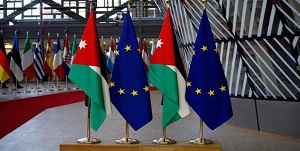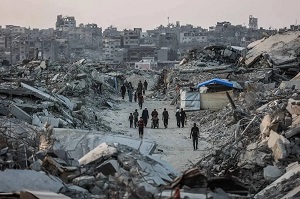Why Are We Surprised by Iran’s Inaction? - By Hazem Saghieh, Asharq Al-Awsat
Flow of statements were expected to make headlines in press and social media over Iran's inaction after Fakhrizadeh’s murder, which had been preceded by Soleimani’s killing. Not only to gloat over Iran's regime - rather to highlight how Iran’s current situation might be historically unprecedented; if there were a precedent, it had been a rarity. Strike after strike, humiliation after humiliation, in Syria, Iraq, Lebanon and even in Iran, and still, Tehran did not retaliate against those accused of every blow. Whoever is killed, the response remains the same: An escalation in verbal threats and insults.
Gamal Abdel Nasser, for example, tried to retaliate to the humiliating defeat in 1967 with a war of attrition. Even Hafez al-Assad, who coined the phrase “choosing the right time and place,” fought the October War, and the prospect of confronting the Israelis through airstrike crossed his mind for a moment upon their invasion of Lebanon.
Such reactions do not cross the Iranian authorities’ minds. Insults aside, Tehran’s behavior suggests that humiliation and strikes are part of the natural order of things: No official resigned because of them. No officer or security official committed suicide because he failed to prevent them. Ismail Qaani, the commander of the Quds Force, borrowed his words from those of tribal wars: “The perpetrators of the operation cannot wage wars like men, face to face.”Language no longer holds meaning. “Strategic patience,” alone, is the key to salvation.
However, we are not talking about a regime known for its patience, love of peace, or one that follows an ideology that prioritizes peace and stability to ensure the success of developmental programs. It is an intrinsically belligerent regime that sees the world as nothing more than a stage for antagonisms- one that only advocates ideas of wars against “devils.” On top of that, it uninterruptedly calls for “the destruction of Israel.”
Even with regards to culture; since the 1979 revolution, thousands of articles and studies have emerged affirming that Khomeinism changed the interpretation of Shiite rituals from ones in which believers direct their anger at themselves, beating their chests, to practices that emphasize violence directed at opponents and enemies.
The bewilderment is not diminished by the argument which states that Tehran does not want to be drawn into the “Israeli trap” - as Tel Aviv is working to put the new US president before a new status quo. To say that Tehran wants to “avoid being drawn” does not hold water when insults keep coming out every day. This behavior may not tempt Joe Biden to be more generous with Iran than Donald Trump has been. The new administration may conclude that there is no need to come to an understanding with such a weak, humiliated, and powerless entity!
On the other hand, we know that Iran enthusiastically retaliated to Saddam Hussein’s aggression and fought an extremely costly war, in terms of human life and money, against him. Iran did not want to shorten this war; instead, it turned it into a gateway to fortifying its regime’s grip, which had been soft. We also know that Tehran’s tools and advisers are scattered across neighboring countries and that it supplies its militants with funding and arms. We also know that some of its officials have openly expressed their aspiration to annex the “four Arab capitals.”
What can we understand from this contradiction? In all likelihood, the concept of war, in its Iranian interpretation, refers in practice, particularly and exclusively to neighboring Arab states. But, it does not refer to Israel. With the Arabs, the law of war applies. With the Jewish state, another law, receiving strikes is a matter of course, and not retaliating is also a foregone conclusion.
The “retaliation” might occur in Syria, Iraq, Yemen or Lebanon, and it might be directed at those whom Iran describes as “agents of Israel and America.” But the “retaliation” won’t be directed against either Israel or America. This is why Tehran won’t submit to Tel Aviv and Washington, as its extraordinarily negative and submissive behavior indicates, so long as it “retaliates to their attacks” in Arab countries.
In truth, this is not a discovery. Iran is not concerned with fighting Israel in the first place, and if it were, it would have followed the policy followed by all other fighters in history; that is, expanding its circle of friends and limiting hostility to the faction it wants to fight. In other words, had it been preoccupied with fighting Israel, it would have adopted policies that suited its neighbors and tried to resolve its differences with them. It has done the contrary, and it continues to do so exactly because it is not interested in fighting Israel.
The aim here is not to embarrass those who do not fight Israel, nor is this a demand for war, any war, with it or anyone else. Rather, it is a request for honesty, even just for once. The truth we live today, which is a simultaneously strange, scandalous and painful one, is that the anti-Israel project is now led by mere ruins: Its political, economic and cultural wreckage, which we call the Iranian regime. Thus, the leadership came to be defined by mere lies, whereby it neither fights nor makes peace; or rather, it neither fights there nor makes peace here. In fact, Tehran’s stances, including its strange, alarming, offensive and humiliating ones, are a valid cause for reflection, comment and, of course, satire!
Latest News
-
 EU Parliament greenlights €500 million aid package for Jordan
EU Parliament greenlights €500 million aid package for Jordan
-
 Safadi, Palestinian vice president discuss Gaza ceasefire, escalation in West Bank
Safadi, Palestinian vice president discuss Gaza ceasefire, escalation in West Bank
-
 King, Lebanon president discuss regional developments
King, Lebanon president discuss regional developments
-
 Israel Defense Minister Vows to Stay in Gaza, Establish Outposts
Israel Defense Minister Vows to Stay in Gaza, Establish Outposts
-
 Cabinet suspends mandatory retirement rules, approves funding measures
Cabinet suspends mandatory retirement rules, approves funding measures